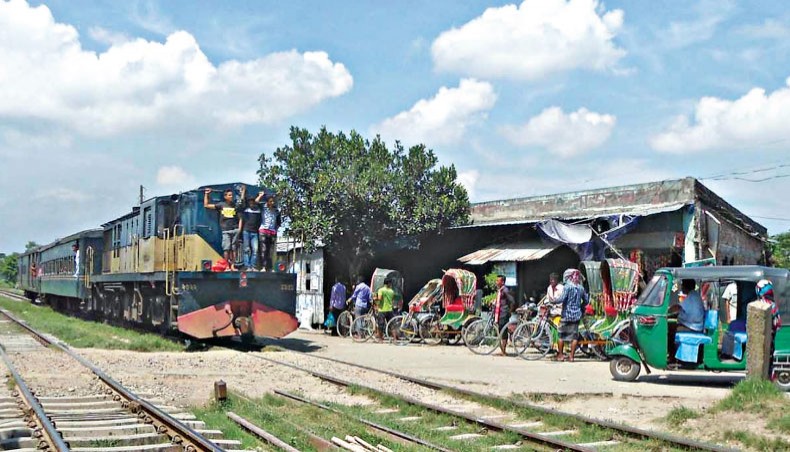Bad roads push up train ticket demand
Bangladesh Railway is struggling to cope with the growing demand for train tickets, thanks much to the dilapidated condition of the country’s highways and roads due to the recent floods.
Railway officials said that in the recent months they witnessed huge demand for train tickets, especially on northern routes, after the floods.
But no new passenger carriages and locomotives were added to railway’s fleet in 2017 despite huge rush of passengers throughout the year.
Highways, roads, bridges, culverts and ferry terminals, left in a bad shape by two consecutive floods this year — flash flood in March-April and regular flood in August-September months — have not been repaired as yet, in the country’s north-eastern and central districts.
Between July 2017 and November 2017 railway carried 3.67 crore passengers while between July 2016 and November 2016 it carried 3.05 crore passengers.
‘As the roads are in a very bad condition, I depend on trains but the service is simply not adequate,’ said Mohammad Sadeque Khan.
Passengers have alleged that scarcity of train tickets is still a big problem despite that the government allocates a huge budget, train fares have been increased and big projects have been taken to improve rail communications.
‘After two floods in 2017 people are preferring trains as rail communications is cost-effective, safe and comfortable,’ railways minister Md Mazibul Hoque told New Age.
They were taking some initiatives to add new coaches and locomotives, he added.
Lastly in October 2016, the railway put 100 meter gauge and 50 broad gauge coaches into its service while no new locomotives were added since 2012-13 fiscal.
Railway officials said that new rolling stocks were crucial to serve the increasing number of passengers and to breathe life into the railway sector and boost earnings, as about 70 per cent of the existing 273 locomotives and about 46 per cent of the existing 1,656 carriages were obsolete and had crossed their economic life.
Meanwhile, a senior traffic department officer told New Age that they would not be able to add more than 17 carriages to a passenger train as most of the stations would not accommodate such long trains.
Only nine kilometre track was constructed on Birol-Birol border section and 156.31 km track was rehabilitated on Parbatipur-Kanchan section out of the railway’s 4,185 km track.
Railway is still being criticised for poor services due to the dirty seating arrangement and uncomfortable stations.
Officials of Dhaka Railway Station, the country’s main station popularly known as Kamalapur rail station, said that after floods demand for train tickets went up.
‘People are returning being failed to get tickets,’ said station master Nipendra Nath Saha.
Bangladesh Road Transport Owners’ Association vice-president Abul Kalam said it now took eight to nine hours to reach Tangail from Dhaka, which was previously two hours.
‘Earlier a bus on Dhaka-Tangail route could make three trips daily while it has now become difficult to cover only one at present,’ he said.
For lack of trips they were facing losses, he added.
In 2017, railway carried 71.87 lakh passengers in May, 69.48 lakh in June, 73.96 lakh in July, 75.38 lakh in August and 74.53 lakh in October.
In November 2017 railway carried 71.42 lakh passengers which was 58 lakh in November 2016.
Roads and Highways Department chief engineer Ebne Alam Hasan said they were yet to get any fund to start road repair and maintenance works.
News Courtesy: www.newagebd.net











